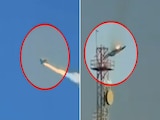- Donald Trump imposed a 50% tariff on Indian goods over Russian oil purchases
- White House adviser Navarro called the conflict "Modi's war" blaming India
- India could reduce US tariffs by 25% if it stop buying Russian crude, he said
Hours after US President Donald Trump's crippling 50 per cent tariff on India came into effect, White House trade adviser Peter Navarro labelled the Russia-Ukraine conflict "Modi's war," claiming it was New Delhi's continued purchase of Russian energy that was fuelling Moscow's military aggression. Pressuring India to halt Russian trade, he said New Delhi could see a 25 per cent reduction in US tariffs if it stops buying discounted crude from Moscow.
In an interview with Bloomberg Television, Navarro referenced Prime Minister Narendra Modi, saying, "I mean Modi's war because the road to peace runs, in part, through New Delhi."
Trump's Tariffs
The remarks came after Trump's 50 per cent tariff on Indian goods took effect earlier Wednesday, a bid the US President has linked to New Delhi's continued purchase of Russian oil. It doubled the existing 25 per cent US duty imposed earlier this month.
Navarro claimed Moscow used money from New Delhi's 'discounted' crude purchase to "fund its war machine." That, in turn, has taxed US resources in the form of requests from Kyiv for arms and funding, he argued.
"Everybody in America loses because of what India is doing. The consumers and businesses and everything lose, and workers lose because India's high tariffs cost us jobs, and factories, and income and higher wages. And then the taxpayers lose because we got to fund Modi's war," Navarro said
Tariff Discounts
"India can get 25 per cent off tomorrow if it stops buying Russian oil and helped to feed the war machine," Navarro said.
The 50 per cent duty on India is the highest reciprocal levy imposed by the US on any Asian nation. It will hit more than 55 per cent of Indian goods shipped to the United States-- India's biggest export market. Although several key products, such as electronics and pharmaceuticals, have been exempted for now, the duties have affected scores of labour-intensive industries, including textiles and jewellery.
The US Trouble
"What's troubling to me is that the Indians are so arrogant about this. They say, 'Oh, we don't have higher tariffs. Oh, it's our sovereignty. We can buy oil from anyone we want...India, you're the biggest democracy in the world, OK, act like one," Navarro said.
The US imposed punitive levies on India despite months of talks between New Delhi and Washington. While India was one of the first nations to enter tariff talks with the Trump team, the two nations have not been able to reach a deal so far.
The Trump adviser accused New Delhi of helping Moscow's war effort. "By purchasing Russian oil at a discount, Russia uses the money it gets to fund its war machine to kill more Ukrainians," he said, echoing the US President's similar remarks on the issue.
India's Stand
India has defended its purchases of Russian oil, saying it was necessary to keep energy prices low and stabilise its domestic market, and has cast the US's actions as "unjustified."
India is the only major economy to be hit by what Trump has cast as "secondary tariffs", even though China is also a major buyer of Russian crude.
Historically, India was not a significant importer of Russian crude, depending more heavily on the Middle East. But that changed in 2022, after Russia invaded Ukraine and the Group of Seven nations imposed a $60-per-barrel price cap to limit the Kremlin's oil revenue while ensuring that supplies continued to flow globally. India's ability to purchase discounted cargoes was a feature of that mechanism, US officials have acknowledged.















